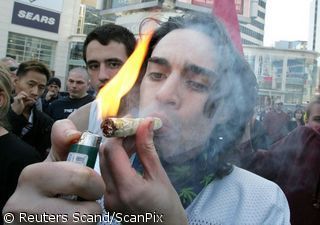Sri Lanka: Foreign minister calls for talks to end `futile' 17-year war.
Published:
18 May 2000 y., Thursday
Ending a lull in their separatist fight, rebels in Sri Lanka resumed an assault on their former stronghold of Jaffna on Tuesday, while the island's government said it was time to talk peace. Foreign Minister Lakshman Kadirgamar acknowledged that Vellupillai Prabhakaran, leader of the Tamil rebels, was fighting a ``good battle'' but said it was time to come to the peace table after 17 years of war.
The government's appeal for peace talks came less than a week after it had rejected a cease-fire to allow nearly 40,000 government soldiers to withdraw from the northern Jaffna Peninsula, which the rebels seek as part of a Tamil homeland. There was no comment on the government peace offer on the Tamil guerrillas' Web sites, but the latest update showed the rebels had resumed their attack on Jaffna after a three-day lull. The Web sites said the rebels had launched assaults on their former stronghold of Jaffna from two fronts and were within one mile of the city. Chief government information officer Ariya Rubasinghe said at least 40 rebels and six soldiers were killed in the clash that erupted late Monday and lasted nearly 12 hours. The fighting took place 2 1/2 miles southeast of the center of Jaffna, the base of Tamil culture and the largest city in the north, where most of the country's minority Tamils live. The Tamils claim they face discrimination from the Sinhalese majority, which controls the government and the military. The Tamil rebels are fighting for a separate homeland in northern Sri Lanka, an Indian Ocean nation off India formerly known as Ceylon. More than 62,000 people have been killed since fighting erupted in 1983.
Šaltinis:
Internet
Copying, publishing, announcing any information from the News.lt portal without written permission of News.lt editorial office is prohibited.
The most popular articles
 75 years after Moscow first opened its underground train system, Muscovites can ride a restored vintage train.
more »
75 years after Moscow first opened its underground train system, Muscovites can ride a restored vintage train.
more »
 A glacier melt threatens to cause massive flooding and destroy a centuries old monastic fortress in the remote country of Bhutan.
more »
A glacier melt threatens to cause massive flooding and destroy a centuries old monastic fortress in the remote country of Bhutan.
more »
 What do countries as geographically diverse as Saudi Arabia, Uganda and Jamaica have in common? All of them criminalised homosexuality.
more »
What do countries as geographically diverse as Saudi Arabia, Uganda and Jamaica have in common? All of them criminalised homosexuality.
more »
 Human rights is a key issue for the European Parliament and MEPs Monday took a first look at what the European Union did last year, when they discussed the EU annual report on human rights in the world.
more »
Human rights is a key issue for the European Parliament and MEPs Monday took a first look at what the European Union did last year, when they discussed the EU annual report on human rights in the world.
more »
 Researchers found high levels of mecury in a Japenese dolphin-hunting town, but say the mecury has no ill effects.
more »
Researchers found high levels of mecury in a Japenese dolphin-hunting town, but say the mecury has no ill effects.
more »
 Crowds of Mexicans marched peacefully through the capital city on Saturday demanding the legalisation of marijuana.
more »
Crowds of Mexicans marched peacefully through the capital city on Saturday demanding the legalisation of marijuana.
more »
 Prisoners are reported to have dramatic improvements in behaviour after pets are introduced in a new scheme.
more »
Prisoners are reported to have dramatic improvements in behaviour after pets are introduced in a new scheme.
more »
 Israeli Ultra-Orthodox MPs are lining up against activists proposing a total ban on furs, saying traditional fur hats are an important part of their religious tradition.
more »
Israeli Ultra-Orthodox MPs are lining up against activists proposing a total ban on furs, saying traditional fur hats are an important part of their religious tradition.
more »
 EU Member States should organise social protection, including at least 14 weeks' maternity allowance, for self-employed women and self-employed men's wives or life partners, in accordance with national laws, said the Women's Rights Committee on Tuesday.
more »
EU Member States should organise social protection, including at least 14 weeks' maternity allowance, for self-employed women and self-employed men's wives or life partners, in accordance with national laws, said the Women's Rights Committee on Tuesday.
more »
 How are the European Parliament, the European Commission and other parts of the European Union supposed to interest people and explain their work?
more »
How are the European Parliament, the European Commission and other parts of the European Union supposed to interest people and explain their work?
more »